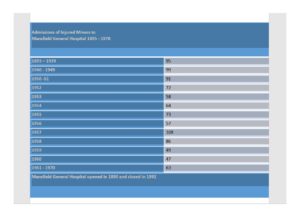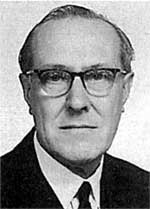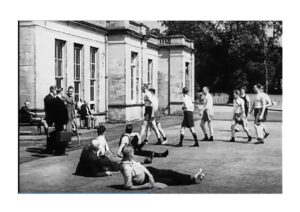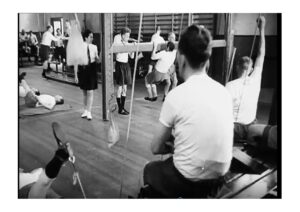BLOG 6 – REHABILITATION pre Nationalisation
“The rehabilitation problem in coal-mining is a very big one because the accident rate is so high (five times higher than the average industrial accident rate), the injuries are of a severe type, and there is no really light work to offer disabled men.” E A Nicoll, Surgeon in Charge, Miners Rehabilitation Centre, Berry Hill, Mansfield, (Rehabilitation of the Injured’, British Medical Journal, 5 April, 1941).

Coal Miner admissions to Mansfield General Hospital, 1895 – 1970
E A Nicoll was appointed Consultant General Surgeon in Mansfield 1931 and Consultant Orthopaedic Surgeon in 1948. Over half of the cases in his fracture clinic, about 1200 a year, were miners.

Ernest A Nicoll, Consultant General Surgeon, Mansfield District Hospital and Surgeon in Charge at the Miners Rehabilitation Centre, Berry Hill, Mansfield

Patients at the Miners Rehabilitation Centre greeting a new arrival, 1941, screenshot from ‘They Live Again’, British Council, 1941
The Miners’ Rehabilitation centre housed a gymnasium and a remedial workshop. It was not part of the local (Mansfield) hospital, which Nicoll believed had certain psychological advantages; patients who lived nearby could attend daily; those who lived further away, were under-nourished or whose home circumstances were unsuitable lived in. The treatment was intensive and aimed at each individual’s injuries. There were graduated remedial exercises, occupational therapy, physiotherapy and remedial games. However, perhaps more important, the gospel of rehabilitation was drummed into the patients – that recovery could only come by the unremitting hard work of the patient himself.

Rehabilitation of injured miners at the Miners Rehabilitation Centre, screenshot from ‘They Live Again’ 1944
The Berry Hill Miners Rehabilitation Centre, prior to Nationalisation, was established by the Midland Colliery Owners’ Mutual Indemnity Company in Association with the Bolsover and Butterley Colliery Companies. At that time it was at the service of the entire coalfield, which extended over seven counties. It was administered by a committee consisting of two representatives of the Owners’ and two representatives of the Miners’ Union.
They Live Again | British Council


My father, John Gaven Mitchell suffered a broken spine in a accident at Welbeck Colliery I think in 1946. The fracture was in the lumber region close to the spinal cord. Mr Nicoll was his surgeon. Mr Nicoll later told my dad that he, Mr Nicoll had toured America lecturing on my dads back.
My father returned to work but always had to wear a support corset but lived to 83 years of age.
Thank you for sharing that with us John; it definitely adds an extra dimension to the history of these important developments in the treatment of these very serious and life changing injuries to miners. Your dad would rightly have felt that he contributed to the sharing of such valuable knowledge worldwide and this may well have contributed to better treatment for other miners in other countries.